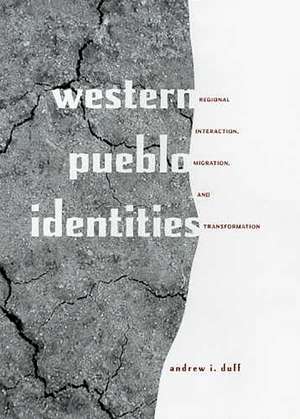Western Pueblo Identities: Regional Interaction, Migration, and Transformation
Autor Andrew I. Duffen Limba Engleză Hardback – feb 2002
Identifying distinct social groups of the past has always challenged archaeologists because understanding how people perceived their identity is critical to the reconstruction of social organization. Material culture has been the standard measure of distinction between groups, and the distribution of ceramics and other artifacts has often been used to define group boundaries. Western Pueblo Identities argues that such an approach is not always appropriate: demographic and historical factors may affect the extent to which material evidence can define such boundaries. Andrew Duff now examines a number of other factors—relationships among settlement size, regional population densities, the homogeneity of material culture, and local and long-distance exchange—in order to trace the history of interaction and the formation of group identity in east-central Arizona and west-central New Mexico from A.D. 1275 to 1400.
Using comparative data from the Upper Little Colorado and Zuni regions, Duff demonstrates differences in patterns of interaction within and between regions with different population densities. He then links these differences to such factors as occupational history, immigrant populations, the negotiation of social identities, and the emergence of new ritual systems. Following abandonments in the Four Corners area in the late 1200s, immigrants with different historical backgrounds occupied many Western Pueblo regions—in contrast to the Hopi and Zuni regions, which had more stable populations and deeper historical roots.
Duff uses chemical analyses of ceramics to document exchange among several communities within these regions, showing that people in less densely settled regions were actively recruited by residents of the Hopi and Zuni regions to join their settlements. By the time of the arrival of the Spaniards, two distinct social and territorial groups—the Hopi and Zuni peoples—had emerged from this scattering of communities. Duff's new interpretations, along with new data on ceramic exchange patterns, suggest that interaction is a better way to measure identity than more commonly used criteria. His work offers new perspectives on the role of ritual in social organization and on identity formation in Pueblo IV society and is rich in implications for the study of other sedentary, middle-range societies.
Using comparative data from the Upper Little Colorado and Zuni regions, Duff demonstrates differences in patterns of interaction within and between regions with different population densities. He then links these differences to such factors as occupational history, immigrant populations, the negotiation of social identities, and the emergence of new ritual systems. Following abandonments in the Four Corners area in the late 1200s, immigrants with different historical backgrounds occupied many Western Pueblo regions—in contrast to the Hopi and Zuni regions, which had more stable populations and deeper historical roots.
Duff uses chemical analyses of ceramics to document exchange among several communities within these regions, showing that people in less densely settled regions were actively recruited by residents of the Hopi and Zuni regions to join their settlements. By the time of the arrival of the Spaniards, two distinct social and territorial groups—the Hopi and Zuni peoples—had emerged from this scattering of communities. Duff's new interpretations, along with new data on ceramic exchange patterns, suggest that interaction is a better way to measure identity than more commonly used criteria. His work offers new perspectives on the role of ritual in social organization and on identity formation in Pueblo IV society and is rich in implications for the study of other sedentary, middle-range societies.
Preț: 345.52 lei
Preț vechi: 468.68 lei
-26% Nou
Puncte Express: 518
Preț estimativ în valută:
66.12€ • 68.61$ • 55.27£
66.12€ • 68.61$ • 55.27£
Carte indisponibilă temporar
Doresc să fiu notificat când acest titlu va fi disponibil:
Se trimite...
Preluare comenzi: 021 569.72.76
Specificații
ISBN-13: 9780816522187
ISBN-10: 0816522189
Pagini: 233
Dimensiuni: 152 x 229 x 20 mm
Greutate: 0.53 kg
Ediția:New.
Editura: University of Arizona Press
Colecția University of Arizona Press
ISBN-10: 0816522189
Pagini: 233
Dimensiuni: 152 x 229 x 20 mm
Greutate: 0.53 kg
Ediția:New.
Editura: University of Arizona Press
Colecția University of Arizona Press
Notă biografică
Andrew I. Duff is Assistant Professor of Anthropology at Washington State University and Research Associate at the Crow Canyon Archaeological Center in Cortez, Colorado. His articles have appeared in the Cambridge Archaeological Journal and American Antiquity.
Recenzii
"This is a fine piece of scholarship having considerable theoretical and methodological value. It is also an enjoyable read. The book clearly has something to say to scholars working on understanding the organizational detail of 'middle-range' societies in the Southwest and beyond, and it goes a long way towards fleshing out such detail. Future efforts to extend that project would be well advised to start with this book." —Journal of Anthropological Research
"Archaeological method and theory are combined to produce a remarkable study of identity formation in the context of demographic, social, and ritual change during the Pueblo IV period . . . will be of interest to all researchers who deal with regional interaction and ethnogenesis, regardless of areal or theoretical specialization."—SAA Archaeological Record
"Archaeological method and theory are combined to produce a remarkable study of identity formation in the context of demographic, social, and ritual change during the Pueblo IV period . . . will be of interest to all researchers who deal with regional interaction and ethnogenesis, regardless of areal or theoretical specialization."—SAA Archaeological Record
